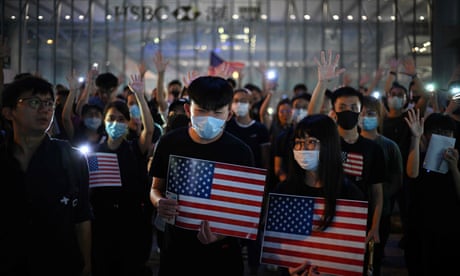Verna Yu
Hong Kong’s beleaguered leader, Carrie Lam, has condemned ongoing violent street protests for dampening the economy and ruining the image of the financial hub, in a key annual policy speech that she was forced to deliver via video link after after being heckled in parliament.
Pro-democracy lawmakers jeered and yelled slogans as she walked into the legislature’s chamber and started to speak, forcing the unprecedented cancellation of the speech. The legislative council resumed sessions on Wednesday for the first time after it was suspended on 12 June, when it was besieged by protesters demanding the withdrawal of a controversial extradition bill.
The chair of the legislature announced the end of the session after Lam was shouted down twice and walked out of the chamber.
The lawmakers called for her resignation and accused her of having “blood on her hands” as the police continued to use excessive force to crack down on the escalating protests, which often end in violent clashes.
Speaking through the video link, Lam condemned the violent attacks carried out by radical protesters in many of the more than 400 demonstrations during the past four months, which have resulted in injuries to more than 1,100 people and the arrests of more than 2,200.
“A handful of rioters initiated attacks and sabotages,” she said. “They spread chaos and fear in Hong Kong and seriously disrupt people’s daily lives.”
She said the violent demonstrations “posed an unprecedented challenge to our economy”, against the background of intensifying trade tension between China and the United States.
She said in the first half of 2019, the Hong Kong economy grew by just 0.5% year-on-year, the worst performance since a recession in 2009. Since July, there have been sharp reductions in visitor arrivals and retail sales and a continued decline in exports, she said.
“The Hong Kong economy has already slipped into a technical recession since the third quarter. In mid-August, the government lowered the economic growth forecast for 2019 to 0 – 1%,” she said.
She announced a raft of initiatives focused mainly on easing housing and land supply in a bid to solve what she called “deep-seated problems” to restore confidence in her administration.
She said she understood the frustrations of people who were unable to own properties due to the soaring prices and acknowledged that it was “a source of public grievances”.
Lam added that the protests have “seriously damaged Hong Kong’s image” and the government would intensify promotion efforts to restore the faith of the outside world.
Attempting to put on an optimistic note, Lam said Hong Kong could rely on the strength of its core values such as the rule of law, efficient bureaucracy, the “one country two systems” model, free trade and its prestigious status as a financial centre. She said she was sure that “the rainbow will emerge after the storm”.

China warns against 'meddling' as US House passes bill backing Hong Kong protesters
But she warned she would not tolerate the advocacy of Hong Kong independence and “challenges to national sovereignty”.
Lam was widely criticised for the lack of political reform measures to address the widespread discontent as analysts said they expected the political crisis to worsen.
“Land and housing issues are no panacea to fix broken politics. This is a government that pretends to govern and a chief executive who pretends to do business as usual,” said Kenneth Chan, a political scientist at the Baptist University of Hong Kong.
Prof Michael Davis, a global fellow at the Woodrow Wilson International Centre, said housing and economic benefits should not be “an excuse to neglect other more fundamental issues regarding Hong Kong’s autonomy”.
“Reducing it to only economics is to adopt Beijing’s main talking points. Beijing readily blames all dissent on economics. There is more at stake,” he said.
As the climate crisis escalates...
... the Guardian will not stay quiet. This is our pledge: we will continue to give global heating, wildlife extinction and pollution the urgent attention and prominence they demand. The Guardian recognises the climate emergency as the defining issue of our times.
Our independence means we are free to investigate and challenge inaction by those in power. We will inform our readers about threats to the environment based on scientific facts, not driven by commercial or political interests. And we have made several important changes to our style guide to ensure the language we use accurately reflects the environmental catastrophe.
The Guardian believes that the problems we face on the climate crisis are systemic and that fundamental societal change is needed. We will keep reporting on the efforts of individuals and communities around the world who are fearlessly taking a stand for future generations and the preservation of human life on earth. We want their stories to inspire hope. We will also report back on our own progress as an organisation, as we take important steps to address our impact on the environment.
You’ve read 13 Guardian articles in the last month – made possible by our choice to keep Guardian journalism open to all. We do not have a paywall because we believe everyone deserves access to factual information, regardless of where they live or what they can afford.
No comments:
Post a Comment